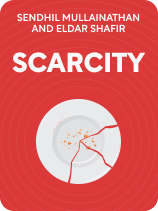

This article is an excerpt from the Shortform book guide to "Scarcity" by Sendhil Mullainathan and Eldar Shafir. Shortform has the world's best summaries and analyses of books you should be reading.
Like this article? Sign up for a free trial here.
What is Sendhil Mullainathan and Eldar Shafir’s Scarcity about? What is the key message to take away from the book?
In their book Scarcity, behavioral science researchers Sendhil Mullainathan and Eldar Shafir explain how scarcities of time and money temporarily change our brains: They make us more efficient with a limited resource in the short term, but they also decrease our mental bandwidth, distorting the way we process information and make decisions.
Below is a brief overview of Scarcity: Why Having Too Little Means So Much by Sendhil Mullainathan and Eldar Shafir.
Scarcity: Why Having Too Little Means So Much
Scarcity is a universal human experience: the feeling that we don’t have enough of what we need. In Scarcity, book authors Sendhil Mullainathan and Eldar Shafir explain how two common scarcities—time and money—temporarily change our brains: These scarcities make us more efficient with a limited resource in the short term, but they also decrease our mental bandwidth, distorting the way we process information and make decisions. The authors then suggest ways to counteract the adverse effects of scarcity.
When we face a scarcity of time or money, others are often quick to point to flaws in our personality, intelligence, or values as an explanation for our predicament. However, the authors’ research flips the script on this narrative—instead of bad choices leading to scarcity, scarcity itself impacts our ability to make good choices. This not only exacerbates scarcity and hinders our ability to cope with it, but it also takes a huge toll on other areas of our lives, like health, relationships, and work.
Sendhil Mullainathan and Eldar Shafir aim to help people understand the psychology of scarcity so we can identify strategies to use it to our advantage in our personal lives and design better policy solutions to alleviate poverty. Shafir is a behavioral scientist and a professor of psychology and public affairs at Princeton University. His research focuses on decision-making in contexts of poverty, and he’s the former Vice-Chair of the World Economic Forum’s Global Agenda Council on Behavior.
Mullainathan is a Professor of Computation and Behavioral Science at the University of Chicago. He received the MacArthur “genius grant” for his interdisciplinary research on behavioral economics, social problems in the US, corporate finance, and development economics. He also co-founded the nonprofit ideas42, which applies behavioral science to solve complex global problems relating to conservation, education, poverty, health, and more.
Scarcity Makes Us More Efficient
To begin unraveling the impact of scarcity on our brains, we’ll first explain how scarcity helps us do more with less. Mullainathan and Shafir define scarcity as the feeling of having less than we need. (Shortform note: The authors’ definition of scarcity is key to understanding their ideas because it’s based on our perception of what we have rather than the physical reality of what we have. In other words, anyone can experience scarcity, regardless of how much wealth or time they have compared to others. This differs from other common definitions of scarcity that define it as the physical reality of something being “not plentiful or abundant.”)
The authors argue that once we perceive scarcity, that perception automatically focuses the mind, involuntarily channeling all of our mental energy into coping with that scarcity. In this section, we’ll look at how scarcity makes us more efficient when we’re short on time and money. The authors refer to this enhanced efficiency as the “focus dividend.”
Scarcity Decreases Our Mental Bandwidth
Although scarcities of time and money provide some benefits, Mullainathan and Shafir argue that we severely underestimate the downside of scarcity, the toll on our mental capacity that they call a “bandwidth tax.” Mental bandwidth is a term that encompasses our cognitive capacity and executive brain function. These concepts boil down to our ability to pay attention to important events, process information, make good decisions, and resist temptations.
Mullainathan and Shafir assert that the same scarcity that gives us laser focus on pressing matters leaves us with little mental bandwidth to do other things in our life well. This hijacking of our mental bandwidth impacts us in three major ways: It makes us neglect other important areas of our life, decreases cognitive performance, and encourages borrowing habits to meet immediate needs—habits that then exacerbate and complicate the initial scarcities.
Strategies to Cope With Scarcity
Given the limited upside of scarcity, and the heavy toll it takes on our mental bandwidth, Mullainathan and Shafir provide recommendations for intentionally manipulating our environment to counteract the psychology of scarcity. In this section, we’ll describe strategies for improving your day-to-day life as well as strategies for organizations to implement.
Strategies for Your Personal Life
The authors explain that by understanding how scarcity impacts your mental bandwidth, you can then deliberately change aspects of your life to account for these deficiencies. Here are some of their recommendations:
1. Create reminders that disrupt the hyperfocus caused by scarcity to avoid forgetting important tasks or to keep you on track with your schedule. This could include text messages or computer notifications—anything that actively grabs your attention.
2. Change default settings so that when you neglect to pay attention to certain things, they get done anyway. The authors suggest setting up auto-pay for your bills or automatically transferring money to a savings account.
3. Minimize temptations. Since we have a lower capacity for good decision-making when we’re in the scarcity mindset, focus on ways to minimize the number of good (forward-thinking) decisions you have to make. For example, instead of going to a mall to shop for something you need, shop in a smaller, specialized store with fewer opportunities to spend money on things you don’t need. (Shortform note: In Profit First, Mike Michalowicz describes an alternative strategy for minimizing your risk of overspending. He recommends making certain bank accounts difficult to access so that giving in to temptation and overspending requires more effort.)
4. Manage high-bandwidth periods. Since bandwidth varies over time, pay your bills or deliberate on financial decisions on non-work days, when you’re less distracted by work tasks due to a scarcity of time.
5. Create buffers of time and money when you can. The authors refer to this concept as “slack,” and it’s essentially the opposite of scarcity: having wiggle room so that you don’t have to make difficult tradeoffs or get increasingly behind on things when unexpected costs or events occur. Create scarcity buffers by setting aside blocks of unscheduled time and setting up savings accounts for emergencies, even if you don’t feel like you have a lot of time or money to spare.
Strategies for Organizations
Although individuals can alleviate some of the cognitive effects of scarcity through targeted behavior changes, organizations can also do their part to reduce the harmful effects of scarcity. Mullainathan and Shafir have the following recommendations:
Create Shorter Deadlines
As we saw in the earlier section on the benefits and downsides of scarcity, abundance often encourages waste, while scarcity fosters efficiency. Therefore, Mullainathan and Shafir claim that imposing long deadlines is likely to result in long periods of inactivity as well as short, stressful periods of productivity. As an alternative, they recommend creating shorter, more frequent deadlines to increase efficiency and reduce opportunities to fall far behind on an intended work plan.
Create Good Options for Impulsive Decisions
Mullainathan and Shafir recommend leveraging the fact that we have less capacity to resist temptations when we’re low on mental bandwidth. They argue that financial institutions could create options that help you save instead of worsening your financial situation when you impulsively want to buy non-essential things. To do this, Mullainathan and Shafir present the idea of placing savings cards near check-out counters in stores instead of candy bars and gum. These are cards that automatically transfer money from your checking account to a savings account, giving you the opportunity to spontaneously save money instead of spending it.
Send Reminders
To counteract peoples’ tendency to forget important annual tasks, the authors say that agencies can send physical or digital reminders to people before deadlines pass. This is similar to the individual strategy in the previous section but can also be implemented by institutions. For example, the Department of Motor Vehicles can mail reminders to renew car registrations, a task that is easy to forget when you’re in the scarcity mindset.
Manage Employee Bandwidth
Mullainathan and Shafir recommend that workplaces intentionally manage employee bandwidth by preventing people from working too many hours and making sure they can get enough sleep. Studies show that productivity drastically decreases when people are overworked and sleep-deprived compared to when they work fewer hours and are well-rested. (Shortform note: The impact of low bandwidth and subsequent sleep deprivation leads to impaired attention and concentration, which has particularly dire consequences in the medical field. In Why We Sleep, Matthew Walker reports that sleep-deprived medical residents have a higher risk of committing surgical errors, misdiagnosing, and causing careless deaths.)
Alleviating the Impact of Poverty: A Unique Scarcity
Now that we’ve covered strategies for mitigating the effects of scarcity, we’ll discuss why poverty is a unique scarcity in terms of its challenges and potential solutions. Mullainathan and Shafir emphasize that the stakes are higher with poverty compared to other forms of scarcity (like not being able to manage your schedule). If someone misses an appointment, they might complicate their tight schedule further—but it’s not an issue of survival, like not being able to pay rent or buy groceries.
In addition, the authors point out that if we’re low on money, we’re also more likely to struggle with a scarcity of time because there are only so many hours we can work to make money.
Financial Scarcity Has Wide–Reaching Impacts
Money is the one thing that controls all of our other resources, so it impacts every aspect of our lives. The authors explain that the domino effect of the scarcity mindset contributes to worse outcomes for poor people in terms of health, parenting, memory, work productivity, and sleep. They support this argument with evidence showing that when scarcity of money is eliminated, the cognitive capacity of people increases. Mullainathan and Shafir emphasize that problems relating to these areas stem from the bandwidth shortage caused by poverty rather than a lack of education or competence.
Health
In the context of health, for example, the authors write that poor people are much less likely to take their medications regularly. Although the medicine might be very important, Mullainathan and Shafir claim that it tends to fall outside of the scarcity-induced narrow focus. This leads to more severe illness even for conditions that are highly treatable, such as high blood pressure.
(Shortform note: Mullainathan and Shafir don’t specify if this problem applies to all illnesses, but based on their argument we can infer that the bandwidth shortage causes poor people to neglect medications for chronic illnesses with long-term consequences. It’s much harder to ignore conditions with immediate consequences for not taking medication, like asthma, although these conditions might also contribute to lower mental bandwidth for other things.)
Parenting
Mullainathan and Shafir argue that meeting common standards for good parenting (like providing consistent rules and connecting with children) are all much more difficult for a poor parent hyper-focused on making scarce resources stretch. They require mental bandwidth to manage numerous areas and make complex strategic decisions.
For example, after working long hours, a parent might have to juggle preparing dinner, cleaning, making sure homework gets done, enforcing disciplinary rules, resolving conflicts between their children, trying to spend quality time with their family, and planning logistics for the next day—all while the parent is focused on making ends meet to cover basic expenses. Mullainathan and Shafir also point out that poor parents can’t use money to ease their workload by hiring tutors or childcare providers.
Memory
People living in poverty also struggle to remember things like paying bills on time or keeping track of appointments. This leads to penalties such as late fees, making it even more difficult for people to pay their bills. Mullainathan and Shafir also write that late fees have more severe consequences for poor people—it might take away from the monthly grocery budget for a low-income person as opposed to being a negligible expense for a wealthy person. They argue that poverty not only increases the stakes for missing a payment but also makes people more likely to forget something like this due to their bandwidth shortage.
Work Productivity
Mullainathan and Shafir also claim that poverty decreases working memory (our ability to keep track of several tasks and process information). This then impacts poor people’s ability to be productive at work. For example, retail workers have to be able to ring up orders, watch out for shoplifting, and be friendly and engaging with customers, all while they’re in a heavily burdened mental state.
Sleep
Mullainathan and Shafir write that poverty also impacts sleep because being preoccupied with financial instability depletes the amount and quality of sleep that poor people get. The effects of sleep deprivation accumulate over time and chip away at peoples’ already depleted mental bandwidth. This then negatively impacts all the other areas discussed in this section, like parenting and work, as well as safety issues like driving.
Changing Social Programs to Minimize Required Mental Bandwidth
Because of the severe and cumulative effects of financial scarcity discussed in the previous section, Mullainathan and Shafir argue that policymakers should design social programs that maximize people’s benefits by minimizing the required mental bandwidth to participate in these programs. This section will describe some of their recommended strategies to implement this.
Educational Programming
Mullainathan and Shafir suggest that educational programs provide classes on a rolling basis so that people don’t have to drop out of a program if they miss one session. Since poor people are more likely to have other tasks pulling their attention away from a class (which isn’t an urgent need), this strategy makes it easier for people to participate even if they can’t consistently show up. For example, if a class consists of four different sessions, stagger the start dates so that if someone misses a session, they can join a different group where they left off.
The authors also emphasize the importance of offering rules of thumb that are easy to remember instead of overloading people with information they won’t be able to process and retain. For example, “always pay off your highest-interest debt first” is a rule of thumb that can make more impact than a lengthy course on financial strategies. This strategy also takes into account the scarcity of time that poor people are more likely to experience because it’s less time-consuming to communicate rules of thumb.
Lastly, Mullainathan and Shafir urge organizations not to focus solely on educational efforts (like classes about nutrition or why it’s important to take your medications) that tax people’s limited time and mental bandwidth. Instead, Mullainathan and Shafir recommend shifting to concrete strategies, like reminders to take medicine. This targets people’s tendency to forget important tasks instead of trying to convince people that tasks such as medication adherence are important.
Social Program Applications
Another strategy to improve social programs is to help people fill out forms and applications since many people miss out on the benefits they qualify for because forms and applications are often tedious, time-consuming, and require many forms of documentation. The authors’ research shows that assisting people with applications in person increases participation rates.
Childcare
Mullainathan and Shafir also argue that reducing the burden of childcare through free or heavily subsidized childcare options can go a long way in freeing up the mental bandwidth of low-income people. They emphasize that childcare requires lots of high-level cognitive functions, and without consistent childcare options, people may also have to juggle transportation and other logistic arrangements with multiple people helping with childcare.
Financial Policies and Programs
The authors also highlight the benefits of changing high-fee payday loans so that some of the fees go toward a savings account for the borrower. They explain that this leverages peoples’ instinct to opt for a quick solution to urgent needs while also reducing the risk of them spiraling into debt. It would also help people establish a financial buffer that can cover unexpected and emergency expenses.
Lastly, employers can help stabilize employees’ income and mitigate the harmful effects of scarcity by providing them with a consistent schedule and paying them more frequently. Mullainathan and Shafir suggest that a stable income would also stabilize people’s mental bandwidth.
In the case of farmers, who are both self-employed and may only receive income at harvest time once a year, Mullainathan and Shafir recommend a financial product that distributes a farmer’s income over the course of a year. This would reduce periods of extreme abundance and scarcity, making farmers more efficient with their monthly income and freeing up mental bandwidth when their money from the previous harvest is low.

———End of Preview———
Like what you just read? Read the rest of the world's best book summary and analysis of Sendhil Mullainathan and Eldar Shafir's "Scarcity" at Shortform.
Here's what you'll find in our full Scarcity summary:
- An exploration of the good and bad sides of a scarcity mindset
- Strategies to counteract the negative cognitive effects of scarcity
- How policymakers should redesign social programs






